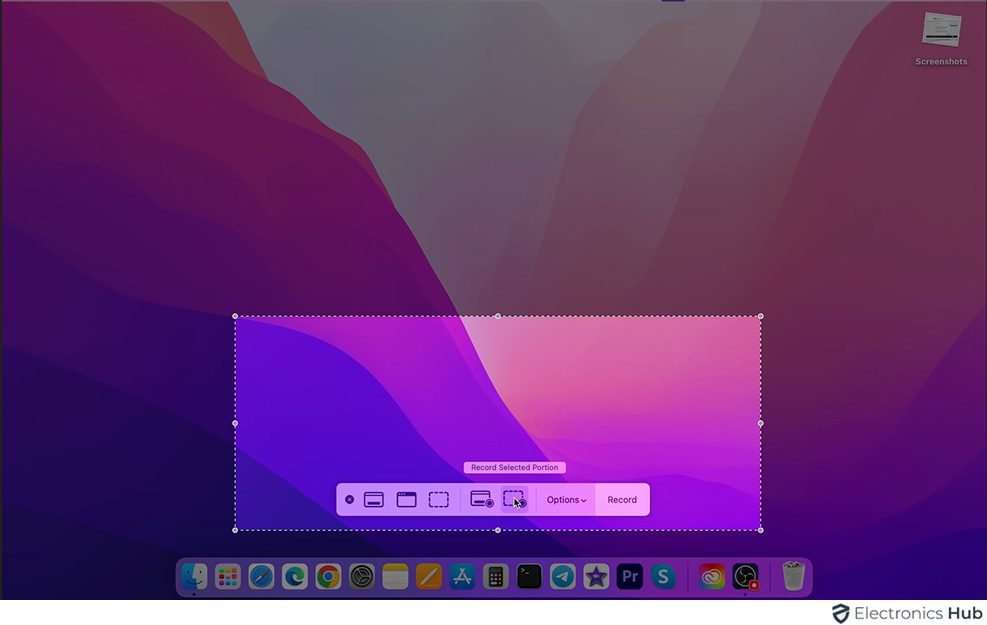The ability to capture your MacBook screen has become a cornerstone for many professionals. Screen recordings offer a clear and concise method for conveying information, whether you’re creating polished instructional videos or demonstrating complex workflows. Fortunately, your MacBook comes equipped with robust built-in tools that streamline the screen recording process.
Let’s take a look at how these methods help in capturing your screen.
Outline
ToggleHow To Screen Record On MacBook?
1. QuickTime Player With Audio
To begin screen recording with QuickTime Player, follow these simple steps:
- Open “QuickTime Player” from your “Applications Folder” or search for it using Spotlight.
- Once QuickTime Player is open, click on the “File” menu at the top of your screen and select “New Screen Recording.”
- A small recording window will appear. Click on the “Record Button” to start recording your screen.
- You can choose to “Record the Entire Screen” or click and drag to “Select a Specific Portion” of the screen.
- If you want to record audio along with your screen recording, click on the “Dropdown Arrow” next to the record button and select your desired audio input source.
- After you’ve finished recording, press “Command + Control + Esc” on your keyboard.
- Save your recording by clicking on the “File” menu and selecting “Save.”
2. Screenshot Toolbar
The screenshot toolbar provides a convenient way to capture your screen without the need for additional software. Here’s how to use it:
a. Entire Screen
- Press “Command + Shift + 5” on your keyboard to open the screenshot toolbar.
- Click on the option to “Capture the Entire Screen”.
- A thumbnail of your screenshot will appear in the bottom right corner of your screen. Click on it to edit or share your screenshot.
- To save your screenshot, simply drag the thumbnail to your “Desired Location” or click on it and select “Save.”
b. Selected Portion
- Press “Command + Shift + 5” to open the screenshot toolbar.
- Click on the option to capture a “Selected Portion” of the screen.
- Drag your “Cursor” to select the area you want to capture.
- “Release the Cursor” to take the screenshot.
- Similar to capturing the entire screen, you can “Edit, Share, or Save Your Screenshot” using the thumbnail that appears.
Screen Record On Macbook – FAQs
Ans: Yes, you can customize various settings such as video quality and microphone input in QuickTime Player before starting your screen recording. Additionally, the screenshot toolbar allows you to adjust settings like where to save your screenshots and whether to include a timer.
Ans: QuickTime, an Apple-developed video player, comes bundled with macOS. It supports various formats including MPEG, AVCHD, AVI, and DV.
Ans: The file size of a screen recording depends on various factors such as the duration of the recording, the resolution, and the content being recorded. Generally, screen recordings can range from a few megabytes to several gigabytes in size.
Ans: While there’s no built-in feature in macOS to schedule screen recordings, you can use third-party automation tools like Automator or AppleScript to create custom workflows for scheduling recordings. These tools allow you to automate repetitive tasks on your MacBook and can be configured to start and stop screen recordings at predetermined times.
Ans: Yes, screen recordings will capture system notifications or alerts that appear while recording. These notifications will be included in the recording unless you choose to edit them out during post-production. If you prefer not to capture notifications, you can enable “Do Not Disturb” mode or temporarily disable notifications in your system preferences before starting the recording.
Conclusion
That concludes the guide on capturing your MacBook screen! With the built-in Screenshot tool, you can record your entire display or a specific portion, with or without audio. Remember, you can customize these recordings further with options like including mouse clicks or setting a delay. Thanks for reading, and happy screen recording!










